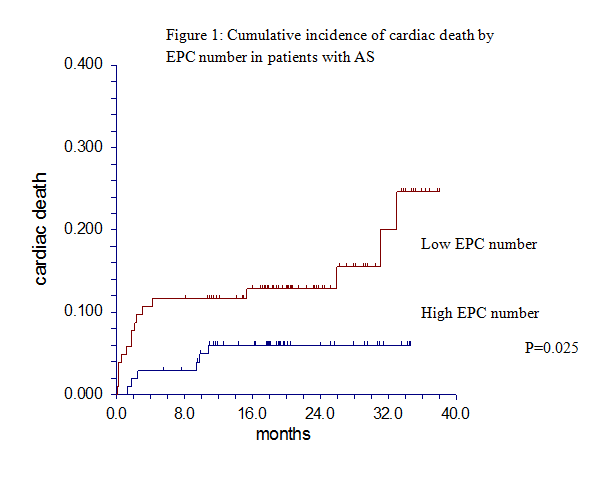Introduction: Degenerative aortic stenosis (AS) is the most common valvular disease. Endothelial progenitor cells (EPCs) have a role in the repair of endothelial surfaces after injury. The aim of this study was to assess EPC number in pts with AS and to study the predictive value of circulating EPC levels on prognosis in pts with AS.
Methods: The number of EPCs was determined by flow cytometry in 244 consecutive pts with AS and a control group of 75 pts. Thirty eight pts had mild AS, 52 pts had moderate AS and 154 pts presented with severe AS. We evaluated the association between baseline levels of EPCs and functional improvement after an intervention and death from cardiovascular causes.
Results: The EPC number was significantly higher in pts with AS compared to the control group (p=0.026). There was no difference in EPC number among pts with mild, moderate or severe AS. Two hundred and six pts with moderate and severe AS were followed for a median of 20 months for the occurrence of cardiovascular events. One hundred and twenty pts underwent an intervention. Sixty-two percent showed improvement in functional class after the intervention and 38% did not improve. The EPC number was significantly higher in pts with functional improvement compared to those that did not improve (p=0.01). Forty one pts died during follow up, 21 pts died due to cardiac causes. Advanced age, the presence of CAD, high NYHA class, low aortic valve area, elevated pulmonary artery pressure and low EPC number were found to be predictors of cardiac death in the univariant analysis. Multivariant logistic regression model identified only low EPC number as associated with cardiac death during follow up (p= 0.025, Figure 1).
Conclusions: EPC number is increased in pts with AS. However, in pts with moderate or severe AS a relatively low number of EPCs is associated with lack of functional improvement after intervention and with cardiac death at follow up. These results may help to identify AS pts at increased cardiovascular risk.


